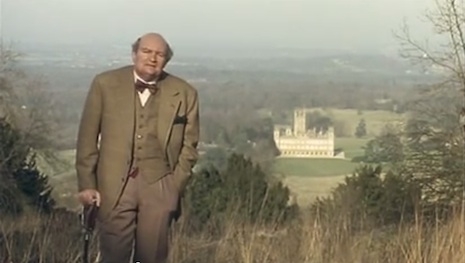
I saw Mike Leigh’s 1992 short film “A Sense of History” twenty years ago on Austrian TV; you wouldn’t ever expect such a thing to pop up on American TV, after all. At that time I thought it was very well executed but a bit obvious as far as satire goes; my more superannuated incarnation of the present moment thinks more highly of it. Leigh’s career has always been a kind of war between red-hot, class-based anger and nuanced, compassionate insight into human nature, and if there’s any truth to that, then “A Sense of History” is about as representative a clip of Leigh’s career as you could ever find.
A side note: Leigh’s 1993 movie Naked is my favorite movie of all time; actually, that and Altman’s Nashville share the top slot. Not long after I saw Naked, in my first “proper” journalistic endeavor, I conducted a… well, incompetent interview with Leigh, who was visiting Vienna for some film festival or other. I recorded our conversation, during which I posed a few admittedly pretentious questions about his unique style of collaborative composition, and the seemingly avuncular Leigh became quite snippy, rejecting the premise of every question and calling every other thing I said “pat thinking.” It was bizarre; he wasn’t opting out of the interview in any way but simply refused to be limited or pigeonholed—not that I blame him for this. (It was a balm to read, years later in The Village Voice, a reference to Leigh’s outsize sternness in a different context; apparently that’s just how he is!) Hilariously, once I was finished with my questions, I turned the recorder off, and we chatted for a little while, and our conversation began to flow more naturally; at one point he kindly gestured towards the recorder as if to say, “Do you want to turn that on?” but I was too stupid, timid, or misguidedly polite to do it. Ah well, lesson learned. I never did transcribe that tape, and somewhere or other I still have the business card that Leigh gave me.

Anyway: While England’s clueless landed gentry are the ostensible target of “A Sense of History,” one might well wonder if the stuffy “Heritage film” of the 1980s and after was just as much an object of his ire. I keep referencing Leigh but after all Broadbent wrote the damn thing; I believe it remains the only movie of Leigh’s in which he does not have a writing credit. Apparently Broadbent wrote it as a radio play and then he and Leigh joined forces to make a short movie; it ended up in the exceedingly curious 1993 omnibus film Two Mikes Don’t Make a Wright alongside Michael Moore’s “Pets or Meat: The Return to Flint” and Steven Wright’s “The Appointments of Dennis Jennings.” It was also nominated for Best Short Film at the 1993 BAFTA Film Awards. Even if one disregards the satire as ineffective, the writing as such is first-rate.
Somebody once said, “Behind every great fortune there is a crime” (the question of who, exactly, said it is pretty interesting), and “A Sense of History” is a literalization of that maxim. Broadbent, familiar to American moviegoers from the Harry Potter series, Moulin Rouge!, Gangs of New York, and several of Leigh’s movies, plays the 23rd Earl of Leete, inheritor of a massive rural estate that has been in the family for 900-odd years. An early reference is made to the sacrifices the previous Earls of Leete made in order to secure and maintain the land, and damned if the 23rd Earl is going to let them down. The Earl has a veneer of doddering gentility that masks a beating heart of ruthless steel.
I’ll say this: the movie holds up much better after several years of protest against the rapacious 1%. At this point, devastating though it may be, I’m not sure it’s even a satire.
via Tombolare